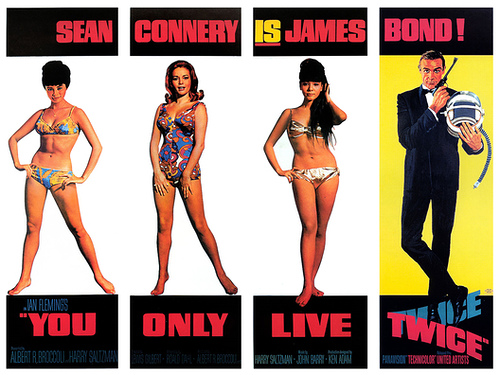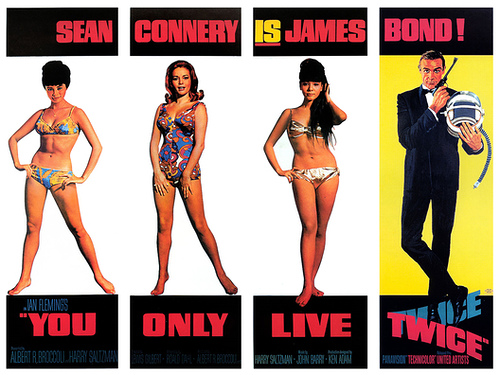James Bond’s You Only Live Twice: Culture bias – now with ninja!

How has our exposure to media shaped our cultural bias? My current cultural studies guided my thoughts during my family’s excursion through Connery’s fifth Bond’s film.
You Only Live Twice hit theaters in 1967, five years prior to my own release date. In the movie, Bond heads to Japan to once again stop SPECTRE from instigating World War III. The movie formed my first opinions of Japan, a country I perceived as being full of fierce ninja to fight and willing geisha to woo. In my previous posts on Bond I questioned the influence that the movies had on that generation’s outlook on gender equality. You Only Live Twice adds a new cultural dimension of perspectives on Japan and Japanese women.
As women undress Bond in a bath house, Bond is instructed:
“Rule number one is never do anything for yourself when someone else can do it for you. And number two – in Japan, men always come first, women come second.”
to which Bond replies,
“I might just retire to here.”
You would be silly and immature to take that rationale seriously.
The first time my submarine docked in Japan, I was a 20-year old Sonar Technician and would consider myself as somewhat silly and immature. It was one of my first foreign ports and I distinctly remember my American arrogance thinking we were so much more advanced than other cultures. I knew not to expect Godzilla, but I did half expect ninja and geisha to be walking down the street much like travelers to Australia often expect kangaroos in downtown Brisbane.
What I found was a culture that was so far advanced in style and media exposure that my grunge Seattle background felt backwards and archaic. I experienced serious culture shock that threatened my preconceptions and bias. My options were to realise my error and realign or reaffirm my inaccurate worldview.
Our generalisations towards characteristics such as age, nationality, or gender are based on past experience, stories from those we deem credible, and media. Each of us are presented with the same two options I had in Japan to reassess our position or reaffirm our bias. Generations after the Bond film have reassessed their perspective on women beyond the position portrayed in the film, although diversity studies show we still have a ways to go towards equality.
The film title says we only live twice. Thankfully we have many more opportunities than that to confront our own bias in each situation to challenge our preconceived and perhaps misguided notions.
I am not saying it is easy, however. I still expect to see ninja when I go to Japan.


“Thankfully we have many more opportunities than that to confront our own bias in each situation to challenge our preconceived and perhaps misguided notions.”
You make this sound like it’s some kind of pandemic disease. Is it really that bad?
You wouldn’t think so, but I can see how you might think so based on the way that some resist the opportunity to engage in a perspective outside of their own. 🙂